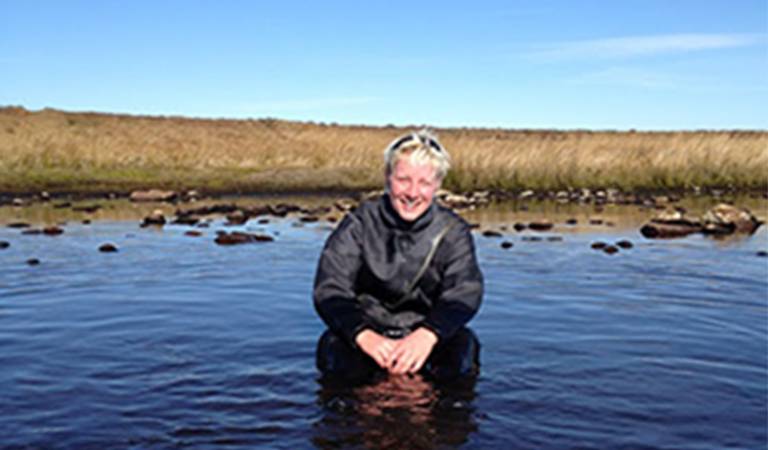Hannah Robson, PhD
Hannah says the scientific methods she is learning in her PhD are invaluable to her career.

11 October 2022
“I was initially considering UCL because I knew the Department had extensive knowledge and expertise in my area of study, but it was really the staff I met on my first few visits that made me decide to study here. Their enthusiasm and expertise, together with the facilities (such as the laboratory), impressed both me and my employer, and it was because of this we decided to apply for a UCL Impact Studentship - in which funding is split equally between UCL and an external industry partner organisation, in my case my employer.
The theory
“I am using lake sediment cores to examine the decline of breeding common scoter. By reconstructing the recent ecological history of breeding lochs we aim to evaluate the three main hypotheses put forward to explain the decline over the last ~30 years.
- Climate change has driven changes in water temperature and trophic status which has adversely affected the abundance and diversity of aquatic invertebrate food, especially during critical chick-rearing periods.
- Common scoters compete with brown trout for food, and the competitive balance between brown trout and scoters may have altered in recent decades.
- Afforestation and drainage of catchments may have altered the physico-chemistry of lakes through increased sedimentation and acidity, adversely affecting food supply for the common scoter.
In addition to establishing core chronology using geochemical and radiometric techniques, I have undertaken biostratigraphic analyses of the cores with particular emphasis on diatoms, chironomids and macrofossils. Diatoms are sensitive to shifts in water quality and habitat availability and are, therefore, valuable indicators of ecosystem change, especially changes in productivity and pH. Chironomid abundance has been found to show clear relationships with the breeding success of water bird populations at other sites because they form a crucial part of the diet of newly hatched chicks. Chironomids are also useful for detecting trophic change and past changes in macrophyte structure and abundance. Macrofossil remains represent plant and animal species present in the loch throughout time, they can also be used to infer changes in fish population density.
The practice
“The main highlight for me has been working with such great people. Research students really feel like they are a valued part of a larger research community. The Department is a supportive and collaborative environment in which students can field ideas, get invaluable experience and access the wealth of knowledge within the Department.
“I have undertaken three fieldwork trips to northern Scotland to sample my study sites. The first trip involved coring 18 lochs and carrying out detailed macrophyte and bathymetric surveys of our lochs. The final trip involved using the “Big Ben” corer, a specialised wide bore corer, designed and constructed within the department at UCL.
“I have developed specialist laboratory and identification skills relating to geochemical, chironomid, diatom and macrofossil analysis. I have also developed a significant number of transferable skills which I’m sure will prove invaluable to me throughout my career such as scientific communication, time management, problem-solving, public engagement and project management to name but a few. UCL Geography also has very good connections, with a wide range of collaborative partners in my field of study. Being able to develop a network of contacts has already proved very useful to me and I’m sure will continue to do so. My research interests focus on developing and using innovative techniques to examine practical conservation management issues and ideally I would like to continue research work in this area of applied freshwater ecology.
“The staff at UCL are great, very welcoming and knowledgeable, I would definitely advise getting in touch with them and talking to them about any PhD projects you are thinking about undertaking.”
 Close
Close

